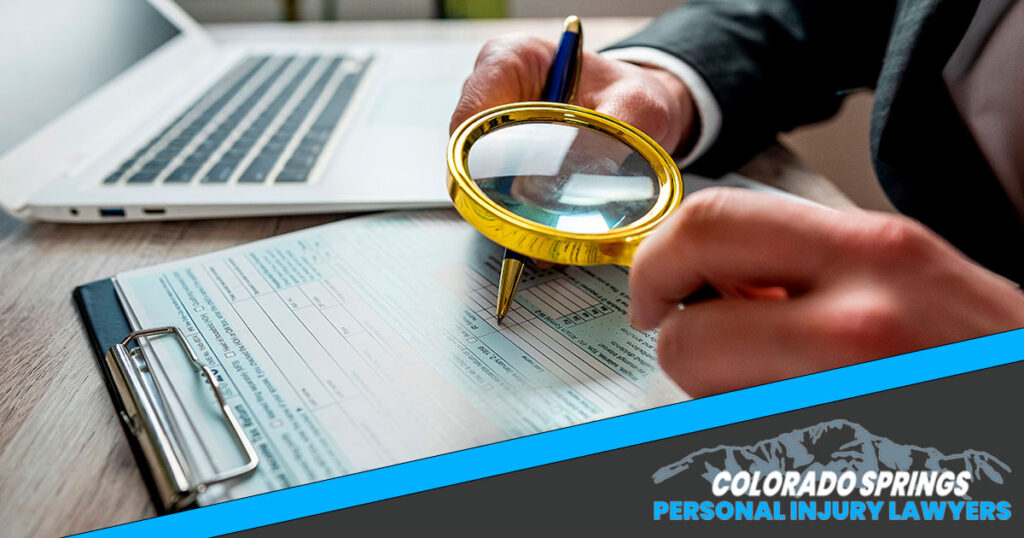Understanding how insurance companies in Colorado Springs investigate car accident claims can make a big difference in the compensation you receive. Knowing their methods for determining fault and payout amounts is essential.
In this article, our expert Colorado Springs car accident attorneys will break down the steps insurance companies take when investigating car accident claims. We’ll also provide valuable tips to help you understand the process so you can avoid making mistakes or losing out on your deserved compensation.
The Role of Insurance Companies in Determining Liability
Insurance companies play a pivotal role in determining liability after a car accident. Their primary goal is to assess fault accurately to decide how much compensation, if any, should be paid out. This process involves a thorough investigation to gather facts and evidence related to the accident.
What Kinds of Accidents Warrant Investigation
While insurance companies investigate all claims to some extent, certain types of accidents warrant more rigorous scrutiny:
Accidents with Significant Damage or Injuries: When there is extensive property damage or severe injuries, insurers conduct detailed investigations to determine the extent of their financial liability.
Multi-Vehicle Collisions: Accidents involving multiple vehicles can be complex, with numerous parties potentially sharing fault. These cases require thorough analysis to allocate responsibility accurately.
Accidents with Disputed Liability: If the parties involved have conflicting accounts of how the accident occurred, insurance companies will delve deeper to establish the facts.
Suspicious Circumstances: If there are any signs of fraud or if the accident details seem inconsistent, insurers will investigate rigorously to rule out fraudulent claims.
Injuries Reported Later: Claims where injuries are reported well after the accident can raise red flags, prompting a closer look to ensure the injuries are genuinely related to the accident.
Understanding the role of insurance companies in determining liability and knowing what kinds of accidents warrant investigation can help you better navigate the claims process. If you find yourself involved in an accident under investigation, consider consulting with a Colorado Springs car accident attorney to protect your rights and interests.
Stage 1: Initial Assessment and Documentation
Upon receiving a claim, insurers initiate an assessment to determine liability. This involves a thorough examination of all available evidence to ascertain fault.
Assessing Fault: Insurers evaluate police reports, witness statements, and physical evidence from the accident scene. These documents help reconstruct the incident and identify which party was negligent.
Clear Evidence: Providing unambiguous evidence of the other party’s negligence is crucial. Photographs, videos, and any other relevant documentation can significantly bolster your compensation claim.
The Process:
During the initial stage of an insurance company investigation process for car accidents, several key activities are undertaken to establish a foundation for liability determination.
Gathering Basic Information
-Collect statements from involved parties and witnesses.
-Obtain police reports and accident scene photos.
Reviewing Policy Terms
-Analyze the insurance policy to understand coverage details.
-Ensure the claim falls within the policy’s scope.
Evaluating Damages
-Assess vehicle damage through inspections and repair estimates.
-Review medical records to evaluate injury claims.
This thorough approach aids in building a clear picture of the incident, supporting fair liability assessment and compensation.
Stage 2: Investigation Through Evidence Collection and Analysis
During the evidence-gathering phase, insurance companies focus on collecting detailed statements from all involved parties. This typically includes:
Statements from Drivers and Passengers: To understand each individual’s perspective of the accident.
Witness Testimonies: Independent accounts can provide unbiased information crucial to determining fault.
Obtaining relevant documents is equally critical. Insurers may request:
Police Reports: Comprehensive reports often contain valuable insights into the accident’s cause and involved parties.
Medical Records: These help correlate injuries with the incident, substantiating claims for compensation.
Vehicle Damage Assessments: Evaluations of vehicle damage are essential for assessing repair costs or total loss values.
The Role of Car Accident Reconstruction in the Investigation Process
Insurance companies often use car accident reconstruction methods to understand how an accident happened and determine who may be responsible.
Here are the main steps involved in this process:
Forensic Analysis: Experts examine skid marks, vehicle damage, and road conditions to recreate the accident scene.
Statements: Gathering statements from everyone involved and any witnesses to support the physical evidence.
Technical Tools: Making use of technology like computer simulations to create a model of how the accident unfolded.
Stage 3: Verifying Claims and Assessing Damages
During this stage, insurance companies focus on the verification process to authenticate claims and assess the extent of damages. This critical step ensures that all aspects of the claim are accurate and supported by sufficient evidence before any compensation is determined.
Why is the Insurer Requesting Additional Information?
Insurance companies may request further documentation and clarification from the claimant to support their case. This could include:
Medical Reports: Detailed records of any injuries sustained, treatments received, and future medical needs.
Repair Estimates: Comprehensive estimates or invoices outlining the cost of vehicle repairs or replacements.
Witness Statements: Additional statements from witnesses or involved parties to corroborate the claimant’s account of events.
Independent Investigations: In complex cases, insurers might conduct independent investigations to gather unbiased information. These investigations often involve:
Hiring Experts: Engaging professionals like accident reconstructionists or medical experts to provide insights based on their specialized knowledge.
Surveillance: Monitoring the claimant’s activities to ensure consistency with reported injuries and limitations.
Can the Insurance Company Follow or Surveil You?
Yes, car insurers can conduct surveillance on claimants, but they must do so within legal and ethical boundaries. Surveillance is one of the tools insurance companies use to verify the legitimacy of claims and to prevent fraud, though it’s usually only applied in high-value cases.
Here’s what you need to know about insurance surveillance:
Reasons for Surveillance
Insurance companies might decide to surveil a claimant under certain circumstances:
Suspicious Claims: If the details of your claim raise red flags, such as inconsistencies in your story or delays in reporting injuries, the insurer may initiate surveillance.
High-Value Claims: Large claims involving significant payouts can prompt insurers to verify the extent of injuries and damages claimed.
Previous Claims History: A history of multiple or questionable claims might lead an insurer to monitor your activities more closely.
Disputed Liability: In cases where fault is contested, insurers may use surveillance to gather additional evidence.
Types of Surveillance
Insurance companies can employ various methods to conduct surveillance, including:
Direct Observation: This involves investigators physically monitoring your activities from a distance. They might follow you to document your daily activities and check for inconsistencies with your reported injuries.
Video and Photography: Investigators may use cameras to capture footage or photos of you, especially in public places. This can provide evidence to support or refute your claim.
Social Media Monitoring: Insurers increasingly monitor claimants’ social media accounts for posts and pictures that might contradict their claims. Publicly shared information can be used as evidence.
Legal and Ethical Boundaries
While surveillance is a legitimate tool for insurers, there are strict legal and ethical guidelines they must follow:
Privacy Rights: Surveillance must be conducted in public spaces. Insurers cannot trespass on private property or invade your privacy unlawfully.
Misrepresentation: Investigators can’t misrepresent themselves to gather information. For example, they cannot pose as someone else to gain access to restricted areas or private information.
State Regulations: Different states have various regulations governing surveillance. Insurers must comply with these local laws to avoid legal repercussions.
What to Do if You Suspect Surveillance
If you suspect your insurer is surveilling you:
Be Honest: Always be truthful in your claims. Accurate and consistent information will support your case and reduce suspicion.
Avoid Social Media: Don’t post about your accident on social media. Make your account private and don’t accept unknown friend requests.
Document Your Condition: Keep thorough records of your medical treatments and any limitations resulting from your injuries. This documentation can counter any surveillance findings that may seem to contradict your claim.
Consult A Colorado Springs Car Accident Attorney: If you believe surveillance is being used unethically or illegally, consult with a legal professional to advise you on your rights.
How Can a Colorado Springs Car Accident Attorney Help Through Insurance Investigations?
Dealing with a car accident aftermath and insurance investigations can be overwhelming. A Colorado Springs car accident attorney can be crucial, helping you understand your rights, gather evidence, and communicate with the insurance company to secure deserved compensation. This section explores how a skilled attorney guides you through complex insurance investigations, offering support and advocacy throughout.
Building a Strong Case with Appropriate Evidence
Legal assistance is crucial when navigating an insurance investigation. Having a skilled Colorado Springs car accident attorney by your side can significantly strengthen your case. Key ways in which an attorney can help include:
Handling Communication with the Insurer: Attorneys ensure that all interactions with the insurance company are accurate and strategic.
Building a Strong Case: They gather and organize essential evidence, such as medical records, witness statements, and accident reports.
Negotiating Fair Settlement: Lawyers leverage their expertise to negotiate compensation that accurately reflects the extent of your damages.
Negotiating a Fair Settlement to Ensure Proper Compensation
Getting the right amount of compensation after a car accident can be tricky. That’s why it’s important to have a specialized Colorado Springs car accident attorney on your side. They can help you in many ways, including:
Talking to the insurance company for you: This makes sure that what you say is clear and can’t be misunderstood.
Gathering evidence: They’ll collect all the information needed to build a strong case.
Negotiating with the insurance company: Using their legal knowledge, they’ll work to get you the best settlement possible.
A good car accident lawyer will be there for you every step of the way, making sure your rights are protected during the investigation process.
Contact a Colorado Springs Car Accident Attorney For a Free Consultation
Dealing with Colorado Springs insurance companies can be overwhelming when it comes to investigating claims. But with the help of a knowledgeable Colorado Springs car accident attorney, you can feel confident that your rights will be upheld throughout the process.
Why Choose Our Attorneys:
Expertise: We have extensive experience in handling car accident claims.
Guidance: We provide step-by-step assistance through each stage of the investigation.
Advocacy: Our commitment is to fight for fair compensation for your injuries and damages.
Don’t hesitate to reach out to our experienced Colorado Springs car accident attorneys today for a free consultation. It’s time to protect your interests and ensure you get the compensation you rightfully deserve.
Protecting The Rights Of Colorado Springs Personal Injury Victims
Our goal is to help victims who have been seriously injured in an accident. At Colorado Springs Personal Injury Lawyers®, we work aggressively to help. We have substantial experience representing injured clients and dealing with insurance companies. Our skills allow us to work strategically and maximize your financial recovery.
For more information please contact us at Colorado Springs Personal Injury Lawyers® to schedule a free consultation with an attorney today.
Colorado Springs Personal Injury Lawyers®
102 S Tejon St Suite 1100
Colorado Springs, CO 80903
(719) 888-4878

















